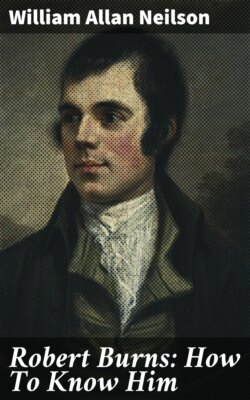Читать книгу Robert Burns: How To Know Him - William Allan Neilson - Страница 6
На сайте Литреса книга снята с продажи.
HANDSOME NELL
ОглавлениеTable of Contents
O, once I lov'd a bonnie lass,
Aye, and I love her still,
And whilst that virtue warms my breast
I'll love my handsome Nell.
As bonnie lasses I hae seen,
And mony full as braw, fine
But for a modest gracefu' mien
The like I never saw.
A bonnie lass, I will confess,
Is pleasant to the e'e, eye
But without some better qualities
She's no a lass for me.
But Nelly's looks are blithe and sweet,
And what is best of a', all
Her reputation is complete,
And fair without a flaw.
She dresses aye sae clean and neat,
Both decent and genteel;
And then there's something in her gait
Gars ony dress look weel. Makes
A gaudy dress and gentle air
May slightly touch the heart,
But it's innocence and modesty
That polishes the dart.
'Tis this in Nelly pleases me,
'Tis this enchants my soul!
For absolutely in my breast
She reigns without control.
Since there may still be readers who suppose that Burns was a mere unsophisticated singer, without power of self-criticism, it may be as well to insert here a passage from a Commonplace Book written in 1783, ten years after the composition of the song.
Criticism on the Foregoing Song
“Lest my works should be thought below Criticism; or meet with a Critic who, perhaps, will not look on them with so candid and favorable an eye; I am determined to criticise them myself.
“The first distich of the first stanza is quite too much in the flimsy strain of our ordinary street ballads; and on the other hand, the second distich is too much in the other extreme. The expression is a little awkward, and the sentiment too serious. Stanza the second I am well pleased with; and I think it conveys a fine idea of that amiable part of the Sex—the agreeables, or what in our Scotch dialect we call a sweet sonsy Lass. The third Stanza has a little of the flimsy turn in it; and the third line has rather too serious a cast. The fourth Stanza is a very indifferent one; the first line is, indeed, all in the strain of the second Stanza, but the rest is mostly an expletive. The thoughts in the fifth Stanza come fairly up to my favorite idea [of] a sweet sonsy Lass. The last line, however, halts a little. The same sentiments are kept up with equal spirit and tenderness in the sixth Stanza, but the second and fourth lines ending with short syllables hurts the whole. The seventh Stanza has several minute faults; but I remember I composed it in a wild enthusiasm of passion, and to this hour I never recollect it but my heart melts, and my blood sallies at the remembrance.”
In spite of the early start in poetry given him by Nelly Kilpatrick, he did not produce more than a few pieces of permanent value during the next ten years. He did, however, go on developing and branching out in his social activities, in spite of the depressing grind of the farm. He attended a dancing school (much against his father's will), helped to establish a “Bachelors' Club” for debating, and found time for further love-affairs. That with Ellison Begbie, celebrated by him in The Lass of Cessnock Banks, he took very seriously, and he proposed marriage to the girl in some portentously solemn epistles which remain to us as the earliest examples of his prose. In order to put himself in a position to marry, he determined to learn the trade of flax-dressing; and though Ellison refused him, he went to the neighboring seaport of Irvine to carry out his purpose in the summer of 1781. The flax-dressing experiment ended disastrously with a fire which burned the workshop, and Burns returned penniless to the farm. The poems written about this time express profound melancholy, a mood natural enough in the circumstances, and aggravated by his poor nervous and physical condition.
But his spirit could not remain permanently depressed, and shortly after his return to Lochlea, a trifling accident to a ewe he had bought prompted him to the following delightful and characteristic production.
